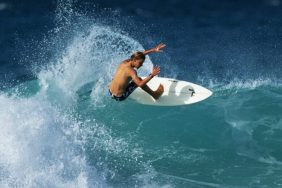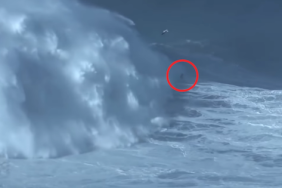Tom Lochtefeld is changing the laws of nature. Waves don’t simply ripple on the open seas anymore. In the early 1990’s, Lochtefeld launched a series of wave pools that brought surfing to the mainland. Twenty years later, major cities are embracing the wave.
This year, Rotterdam unveils its city center RiF010 surf wave pool. It’s a publicly funded surf park that will be hosted on the city center’s canal. Next year, Bristol, England is equally getting swept up in the tide by opening its very own surf and “well-being” camp, appropriately called “The Wave.” According to Lochtefeld, surfers will paddle out to catch the waves, potentially netting up to 20 waves an hour.

A flowrider surfer jumps in midair. Photo courtesy of WaveLoch.
Lochtefeld’s firm WaveLoch promises perfect waves spun out completely by computers. Artificial waves, according to Lochtefeld, are the future, with the potential to revolutionize the idea of surfing. Before, surfing required some critical ingredients: super waves, a board and a beach. But imagine the hordes of newbies who live in the concrete jungle that could be indoctrinated into the religion of Hang 10.
Also: Bureo Creates Skateboards From Waste
Lochtefeld for his part has been surfing since the 60’s, so he knows a thing or two about catching a wave. Couple his surfing life with his passion for technical innovation and he just might have a hit on his hand.

Tom Lochtefeld has been surfing since the 60s. Photo courtesy of WaveLoch.
In the late 80’s, Lochtefeld sold his 25% stake in Raging Waters for $2m and began developing what would eventually become the FlowRider machine with the help of the hydraulics lab at UC San Diego. He patented a “wave-forming generator” and then sold the FlowRider to the Schlitterbahn water park in Texas. Years later, incarnations of his FlowRider machine appear around the world and even on cruise ships.
How does it work? The FlowRider shoots water up an incline that creates a surfable wave sufficient enough for a bodyboard or a shortboard. FlowRiders sell for between $450,000 and $2m.
WaveLoch is now laser focused on wave pools, much larger evolutions of the original idea that harks back to the 80’s. SurfLoch SurfPool uses a pneumatic air system that creates the physics for waves and the pool’s shape creates the essential wave.
This year and the year that follows promise to be a turn in the tide of how we surf and who can surf. With the push for wave pools around the world in midst of the modern city, a new breed of surfers will be catching some waves.







